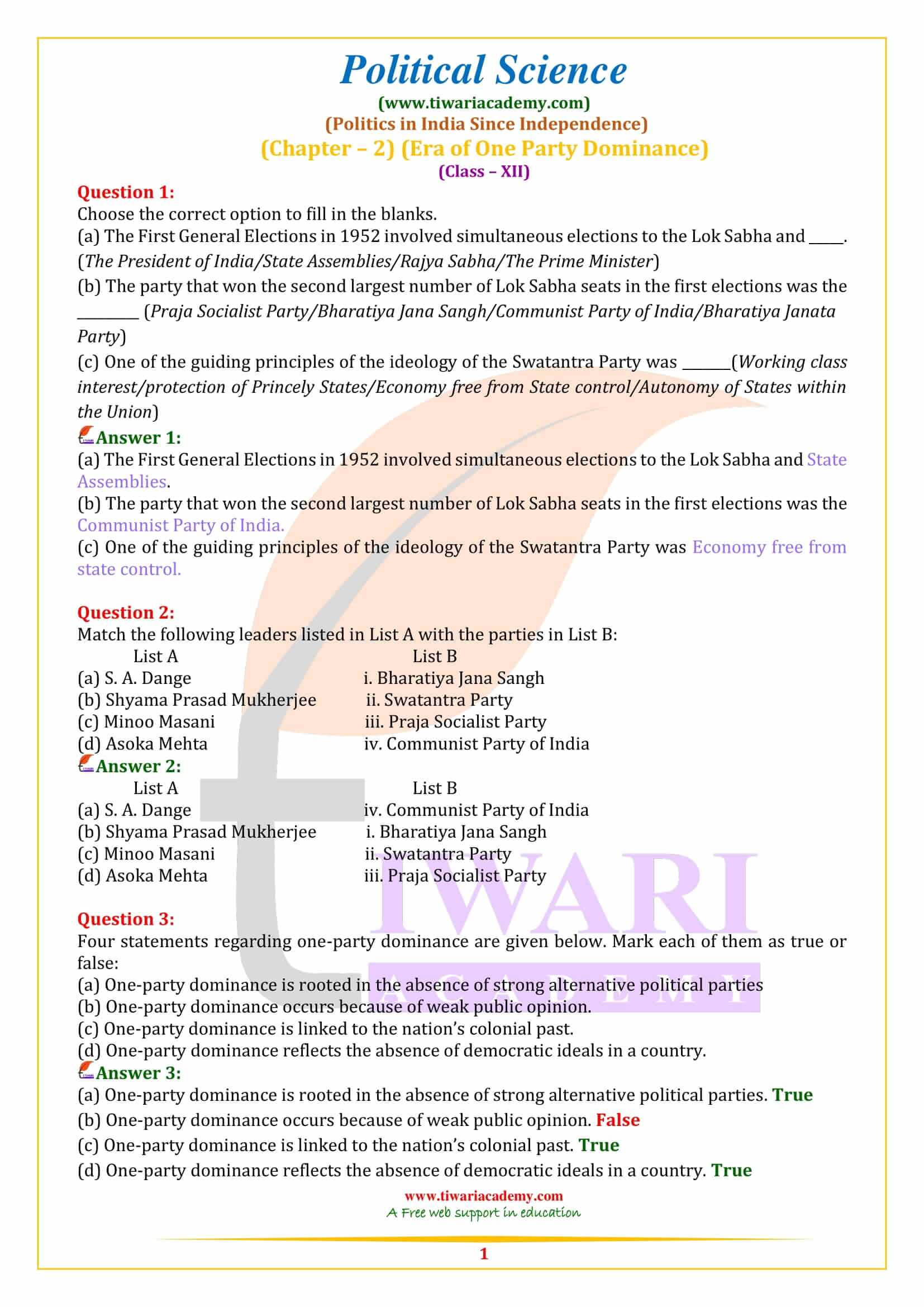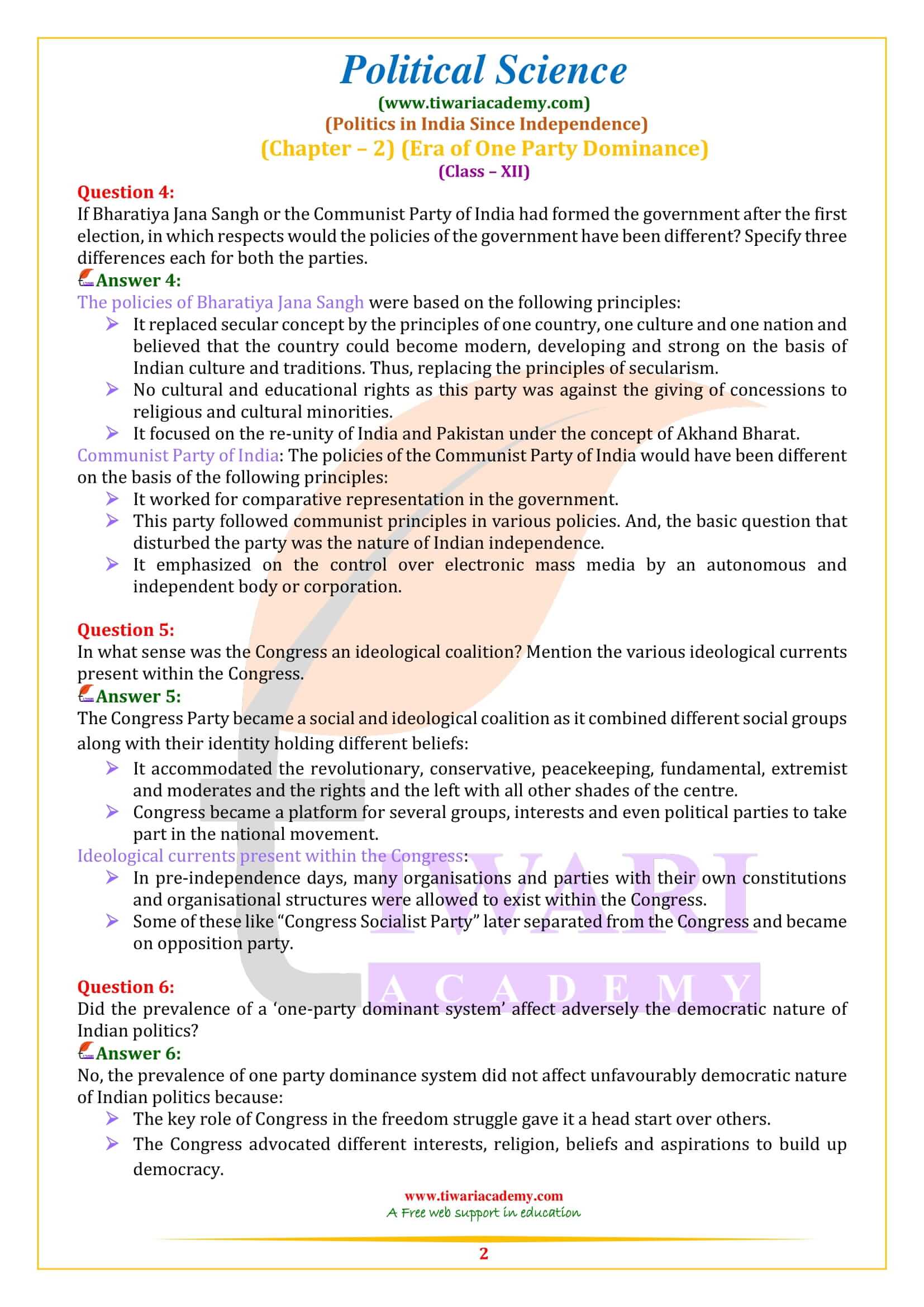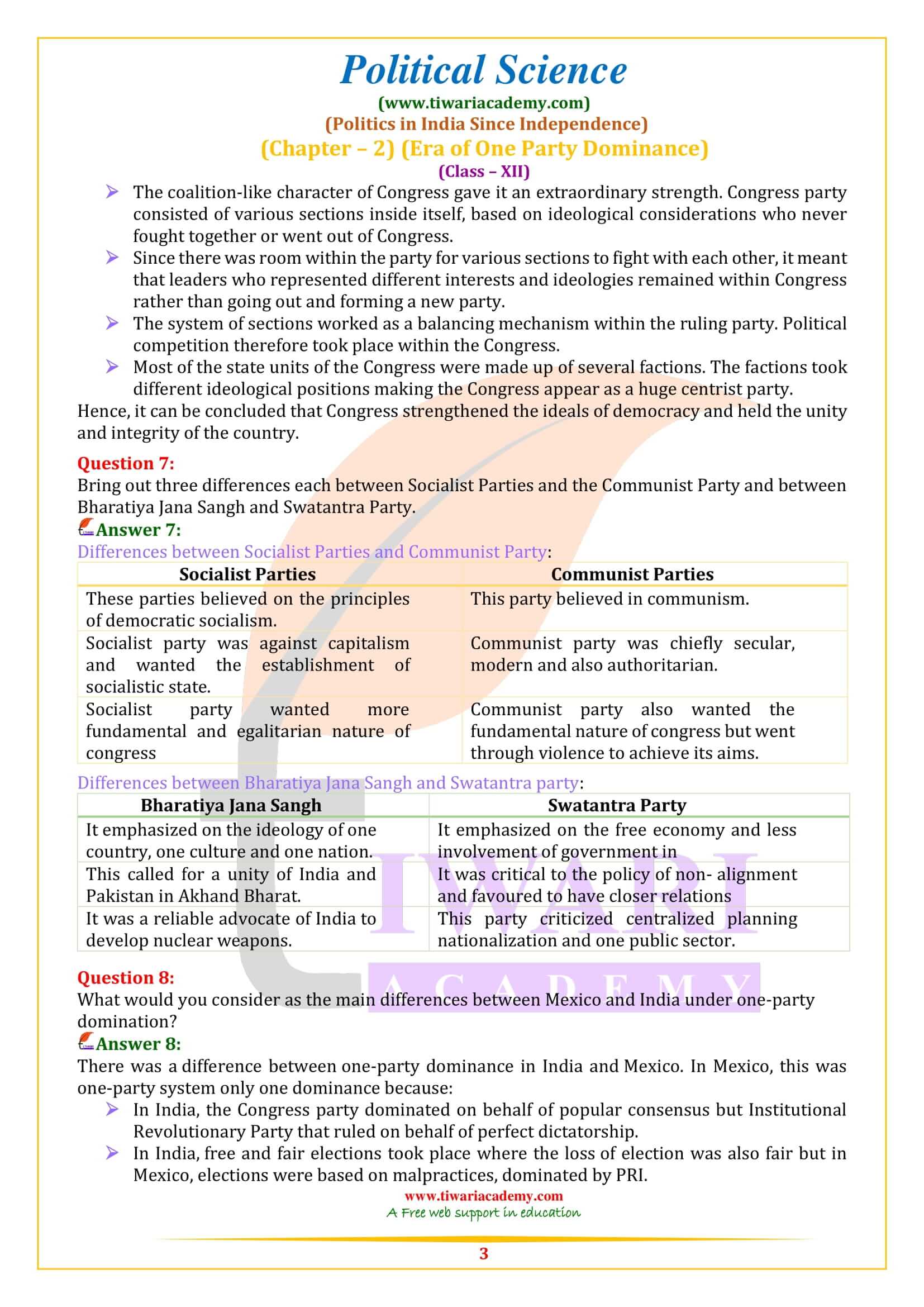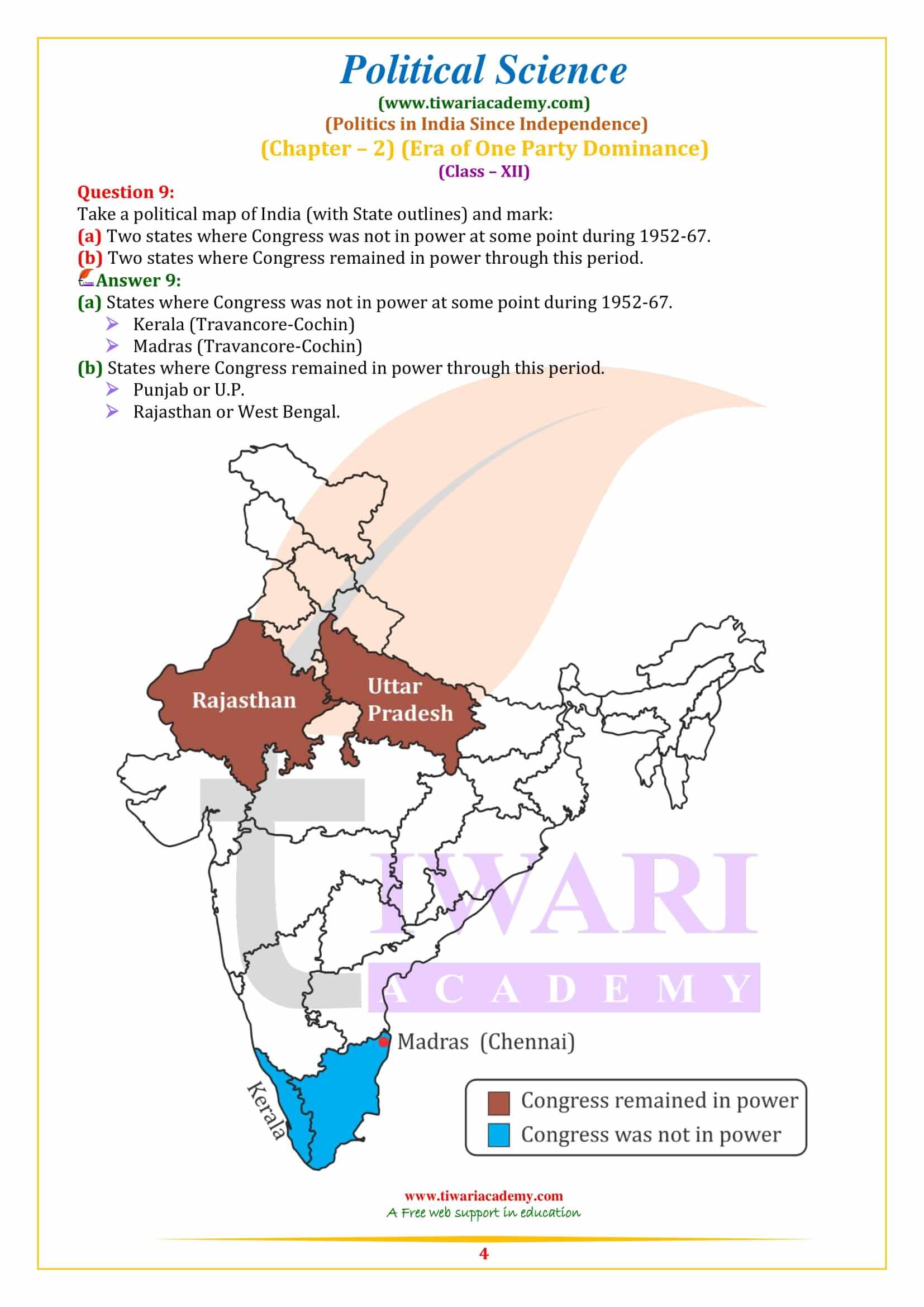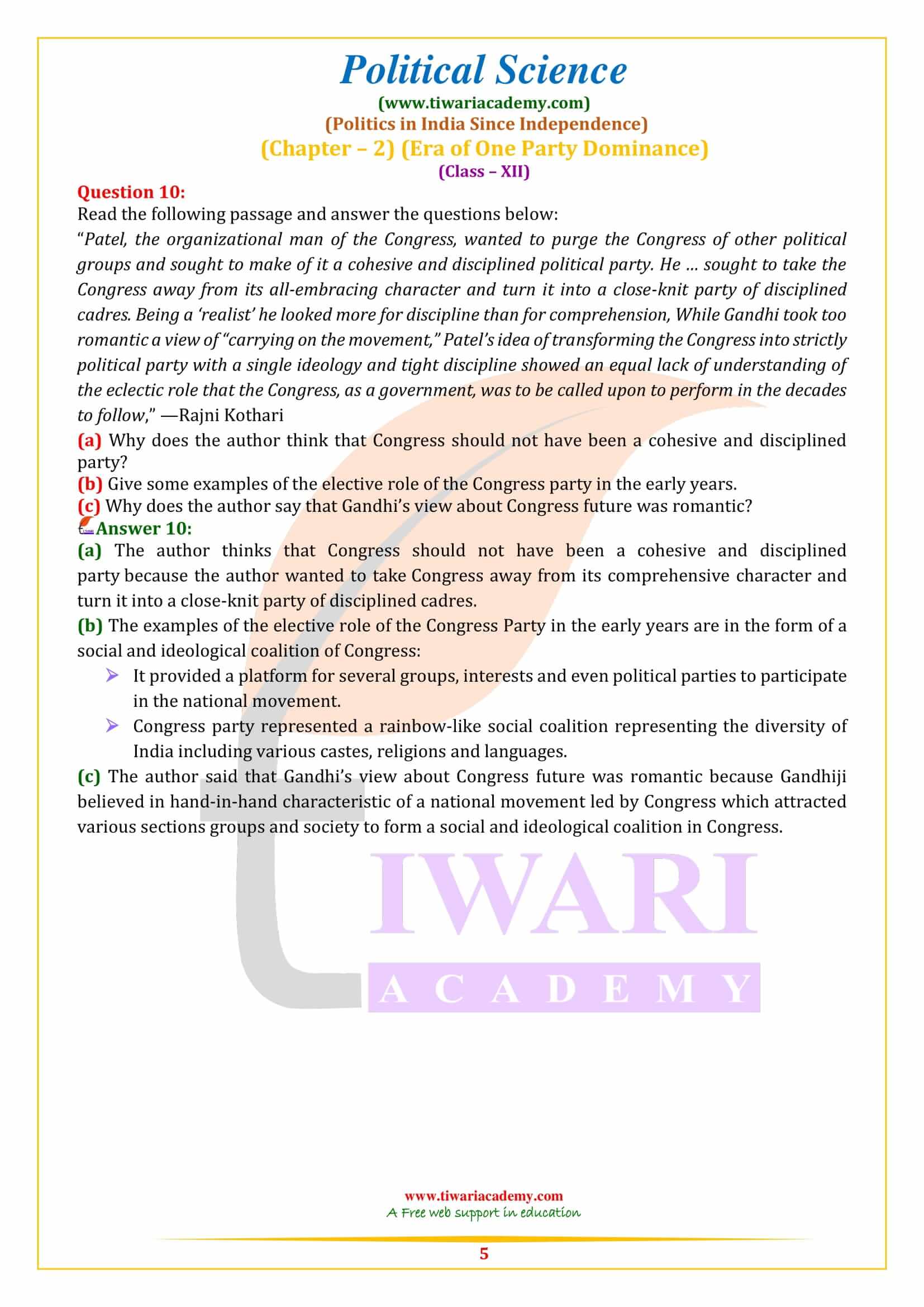NCERT Solutions for Class 12 Political Science Part 2 Chapter 2 Era of One-party Dominance in Hindi and English Medium updated for new session 2025-26 free to download. Questions of Class 12 Political Science Part 2 Politics in India since Independence chapter 2 are explained in simple format to learn. These are easy to understand format.
NCERT Solutions for Class 12 Political Science Chapter 2
Class 12 Political Science Chapter 2 Era of One-party Dominance
If Bharatiya Jana Sangh or the Communist Party of India had formed the government after the first election, in which respects would the policies of the government have been different? Specify three differences each for both the parties.
The policies of Bharatiya Jana Sangh were based on the following principles:
- It replaced secular concept by the principles of one country, one culture and one nation and believed that the country could become modern, developing and strong on the basis of Indian culture and traditions. Thus, replacing the principles of secularism.
- No cultural and educational rights as this party was against the giving of concessions to religious and cultural minorities.
- It focused on the re-unity of India and Pakistan under the concept of Akhand Bharat.
Communist Party of India: The policies of the Communist Party of India would have been different on the basis of the following principles:
- It worked for comparative representation in the government.
- This party followed communist principles in various policies. And, the basic question that disturbed the party was the nature of Indian independence.
- It emphasized on the control over electronic mass media by an autonomous and independent body or corporation.
In what sense was the Congress an ideological coalition? Mention the various ideological currents present within the Congress.
The Congress Party became a social and ideological coalition as it combined different social groups along with their identity holding different beliefs:
- It accommodated the revolutionary, conservative, peacekeeping, fundamental, extremist and moderates and the rights and the left with all other shades of the centre.
- Congress became a platform for several groups, interests and even political parties to take part in the national movement.
Ideological currents present within the Congress:
- In pre-independence days, many organisations and parties with their own constitutions and organisational structures were allowed to exist within the Congress.
- Some of these like “Congress Socialist Party” later separated from the Congress and became on opposition party.
Did the prevalence of a ‘one-party dominant system’ affect adversely the democratic nature of Indian politics?
No, the prevalence of one party dominance system did not affect unfavourably democratic nature of Indian politics because:
- The key role of Congress in the freedom struggle gave it a head start over others.
- The Congress advocated different interests, religion, beliefs and aspirations to build up democracy.
- The coalition-like character of Congress gave it an extraordinary strength. Congress party consisted of various sections inside itself, based on ideological considerations who never fought together or went out of Congress.
- Since there was room within the party for various sections to fight with each other, it meant that leaders who represented different interests and ideologies remained within Congress rather than going out and forming a new party.
- The system of sections worked as a balancing mechanism within the ruling party. Political competition therefore took place within the Congress.
- Most of the state units of the Congress were made up of several factions. The factions took different ideological positions making the Congress appear as a huge centrist party.
Hence, it can be concluded that Congress strengthened the ideals of democracy and held the unity and integrity of the country.
What would you consider as the main differences between Mexico and India under one-party domination?
There was a difference between one-party dominance in India and Mexico. In Mexico, this was one-party system only one dominance because:
- In India, the Congress party dominated on behalf of popular consensus but Institutional Revolutionary Party that ruled on behalf of perfect dictatorship.
- In India, free and fair elections took place where the loss of election was also fair but in Mexico, elections were based on malpractices, dominated by PRI.
Read the following passage and answer the questions below:
“Patel, the organizational man of the Congress, wanted to purge the Congress of other political groups and sought to make of it a cohesive and disciplined political party. He … sought to take the Congress away from its all-embracing character and turn it into a close-knit party of disciplined cadres. Being a ‘realist’ he looked more for discipline than for comprehension, While Gandhi took too romantic a view of “carrying on the movement,” Patel’s idea of transforming the Congress into strictly political party with a single ideology and tight discipline showed an equal lack of understanding of the eclectic role that the Congress, as a government, was to be called upon to perform in the decades to follow,” —Rajni Kothari
Why does the author think that Congress should not have been a cohesive and disciplined party?
The author thinks that Congress should not have been a cohesive and disciplined party because the author wanted to take Congress away from its comprehensive character and turn it into a close-knit party of disciplined cadres.
Give some examples of the elective role of the Congress party in the early years.
The examples of the elective role of the Congress Party in the early years are in the form of a social and ideological coalition of Congress:
- It provided a platform for several groups, interests and even political parties to participate in the national movement.
- Congress party represented a rainbow-like social coalition representing the diversity of India including various castes, religions and languages.
Why does the author say that Gandhi’s view about Congress future was romantic?
The author said that Gandhi’s view about Congress future was romantic because Gandhiji believed in hand-in-hand characteristic of a national movement led by Congress which attracted various sections groups and society to form a social and ideological coalition in Congress.
